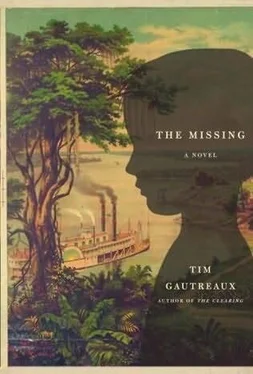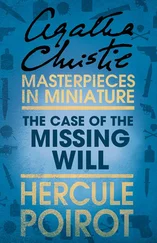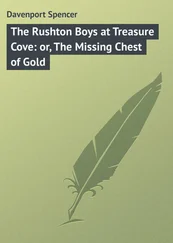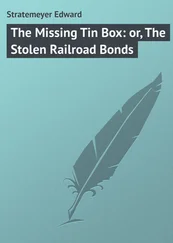“It’s my bidness to lay low,” Swaneli said. “That way I can keep an eye on things, you know?” He made a sideways motion with his head.
“You’re the power man. Got a blackjack on you.”
Swaneli put a hand on Sam’s shoulder and squeezed it. “Look, right now I need you to go topside. The hardlegs up there are smokin’ and all in love this time of night. Walk the rail and look for cigarettes they’ve tossed. Every butt you see, lit or not, put your toe on it and twist three times, okay?”
The lights came up on the last note, and the band began to take down music and pack their instruments. People crowded the stairs, and Sam walked up through them and toured the deck, first the open area, then the café, which was hot and nearly empty. He stepped out into the night and looked forward to where Mr. Brandywine then ascended a little filigreed bridge on the hurricane deck. He raised a megaphone and called directions out to a man standing by a steam capstan. The big boat seemed asleep in the water at that point, waiting for some type of decision the current was supposed to make. Finally, Mr. Brandywine turned the megaphone up to the pilothouse’s dark windows. “Mrs. Benton! Give her a nudge.”
A bell jingled in the engine room and two snoring chuffs jetted from the escape pipes as the boat leaned into the wharf and tapped a piling right where a deckhand held a hemp fender against the hull. The fore and aft lines went out and a stop-engine bell rattled as the boat drifted in snug.
It took an hour to clear the last passengers off, a too-jolly batch of overweight young women. Sam did indeed stamp out a dozen lit cigarettes, and also woke up a drunk boy in the men’s toilet and walked him ashore. Several people lingered under the dock lights, staring at the steamer as though they couldn’t quite believe their ride was over. Their faces showed they’d just been exiled back to their ordinary selves, and they didn’t seem to like it one bit. He walked to the end of the loading stage and surveyed for himself the many lights jeweling the decks, the tired porters sweeping the dark upper walkways, the kitchen staff wiping the third-deck tables and chairs, turning them up to make room for a mop-down of spilled drinks, food, trash paper, and smashed candy. He thought of the cooks swamping down the giant ranges in the hot night, the tobacco-smudged and sticky dance floor, the piss-fouled bathrooms and damaged main-deck lounge already prowled by the ship’s carpenter. It was all fun for somebody, he guessed, but his back and legs were killing him from the night’s climbing and scuffle.
About one-thirty he rolled into his bunk, jammed against the ceiling of his cabin, and a minute later Charlie Duggs came in, stripped down to his drawers, and hung his clothes on two sixteen-penny nails. “Oh, man,” he said in the dark, “I feel like I fell through the paddlewheel.”
After two minutes, Sam sensed that he was already falling asleep, and gratitude to whatever controls man’s slumber flowed through him like a medicine. Then Charlie yawned and said, “Don’t forget to roll out, wash your armpits, and buck up for the ten-thirty harbor tour.”
***
AT EIGHT the next morning the two of them were eating eggs, fried potatoes, and onions with the rest of the crew. The musicians had gone drinking in town after the boat docked and were eating out on the open part of the deck, moping about like wounded soldiers. Charlie folded a piece of white bread in half and waved it in the air over his plate for emphasis. “On the way down from Cincinnati we stopped at an odd little town in Indiana, I think, and ran an afternoon trip. I was nailing down new chocks for the piano during the break, and then Elsie and Ted did a number with the little girl and some of the lady passengers gathered around the bandstand and got this look in their eye like they was ready to start bawlin’. I don’t know why. It was a happy little song. Maybe they thought she was a come-alive baby doll or something.” He took a heaping bite of potatoes.
Sam straightened in his chair. “Where was the town, exactly?”
“That was a busy trip. It might have been in Kentucky, now that I think about it. Every time she sang, the mommies would come up to the bandstand. Maybe they were imagining what kind of life she might have in front of her. Everywhere she sang her two little numbers, she got the same reaction.”
Sam finished his eggs and shoved away his plate. “Some people think a lot about the future and screw up the day they’re walking around in.”
“I hear that.”
Sam did a slow pan of the café and frowned. “You think someone might want to save her from a musician’s life? I got to admit, they bring home about as much as a fry cook. My sergeant in the army sang on some phonograph records. Big labels, too. He was paid ten bucks for two sides of the record and never got a penny royalty.”
Duggs drained his ironware coffee cup and put it down, his head bobbing. “Brother plays in the Orpheum orchestra, and that don’t even pay the food bill for his family. He’s got to do Sunday bandstand work and Elks club dances and all that kind of bullshit.”
Sam tossed his napkin in his plate. “I play a little piano.”
“Pick up some extra scratch that way?”
“People tried to hire me for about a penny a key, so I said the hell with it.”
Charlie threw back his head and laughed.
Captain Stewart walked in and stood in the doorway, which everyone took as a signal to get to work. Before long, the boat was swamped by a special charter for middle-school children. The white band played for the chaperones and a few tourists as the boat eased up along the docks toward the grain elevators, the mates and watch-men keeping the children from walking the rails and swinging from the ceiling fans.
***
TWO DAYS LATER the boat ran a moonlight trip out of Donaldsonville, and two days after that the Ambassador docked in Baton Rouge to run three trips. The advance man had come up in his little Ford two weeks earlier, placed ads in the paper, put up posters on three hundred telegraph poles and in every store window, and talked a Presbyterian church group into a two p.m. trip. The captain gave the Wellers the morning off to go to the police station and report their daughter’s abduction and provide a description. The morning orchestra wasn’t taken too seriously, so Sam took Ted’s place at the piano and played the guitar parts off the chart, smiling at the few couples choosing to box-step next to the bandstand. He was surprised to remember how good it felt to have someone dance to his music. He studied the customers and after the set stood ashore by the stage plank to watch the morning riders file off the boat, looking carefully into each face.
He was going up the main staircase when the Wellers caught up with him, Elsie racing past, saying she needed aspirin. Ted mopped his face with his handkerchief and leaned against the rail. “The damned cops here aren’t interested in lost children from Cincinnati. They wouldn’t call other jurisdictions unless we paid the charges, and we’re about flat broke.” He pulled off his straw and wiped the hatband mark on his high forehead. “The desk sergeant took our description and threw it in a drawer. We asked him a bunch of questions, if there had been any child stealing that he knew off. You know what he told us? He said he had a few kids of his own he wouldn’t mind someone taking off his hands.”
“Sounds like you ran into a jughead. Probably the chief’s brother-in-law.”
Ted glared at him. “That supposed to make me feel better?”
“Look, I’ll lay off the two o’clock trip if the captain gives me the okay, and I’ll see what I can do.”
Читать дальше












